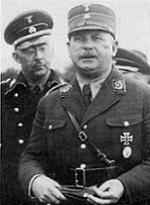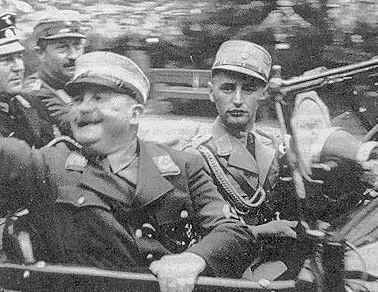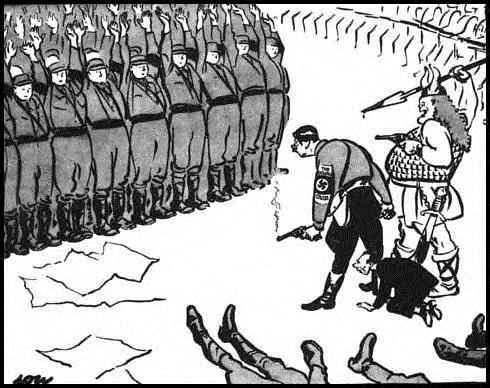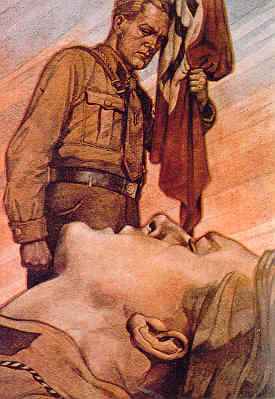Goering: Röhm

Goering: Röhm, from 1931, had been the Chief of Staff of the SA, that is to say, he was responsible, for the SA to the Fuehrer, who was himself the highest SA leader, and he led it in the Fuehrer's name. The main controversy between Röhm and us was that Röhm, like his predecessor Pfeffer, wanted a stronger revolutionary way to be adopted, whereas the Fuehrer, as I said earlier, had ordered a legal development, the final victory of which could be expected. After the seizure of power Röhm desired, under all circumstances, to get hold of the Reich Defense Ministry. The Fuehrer refused that point-blank, as he did not wish the Armed Forces to be conducted politically in any way, or to have any political influence brought to bear on the Armed Forces.
The contrast between the Armed Forces and the Röhm group--I am intentionally not speaking of a contrast between the Armed Forces and the SA, since there was none, but solely of this leadership group, which called itself at that time the SA Leadership and it actually was--was that Röhm wanted to remove the greater number of the generals and higher officers who had been members of the Reichswehr all this time, since it was his view that these officers did not offer a guarantee for the new State, because, as he expressed it, their backbone had been broken in the course of the years and they were no longer capable of being active elements of the new National Socialist State.

A few weeks before the Röhm Putsch a low-ranking SA leader confided in me that he had heard that an action against the Fuehrer and his corps was being planned to replace the Third Reich as expeditiously as possible by a final Fourth Reich, an expression which these people used. I myself was urged and begged to place outside my house not only guards from a police regiment but also to appoint an SA guard of honor. I had agreed, and later on I heard from the commander of these troops that the purpose of that guard of honor was to arrest me at a given moment.

I felt it my duty to consult the Fuehrer now on this subject. I was astonished when he told me that he, too, already knew about these things and considered them a great threat. He said that he wished, however, to await further developments and observe them carefully. The next event occurred just about as the witness Korner described it here, and therefore I can skip it. I was given the order to proceed immediately against the implicated men of the Röhm group in northern Germany. It was decided that some of them were to be arrested. In the course of the day the Fuehrer ordered the execution of the SA leader of Pomerania, Ernst, and two or three others. He himself went to Bavaria where the last meeting of a number of Röhm leaders was taking place and personally arrested Röhm and these people in Wiessee.

After the Fuehrer, on the strength of the events which had been met with at Wiessee, had ordered who should be shot in view of the state of national emergency, the order for the execution of Ernst, Heydebreck, and some of the other Röhm collaborators was issued. There was no order to shoot the other people who had been arrested. In the course of the arrest of the former Reich Chancellor Schleicher, it happened that both he and his wife were killed. An investigation of this event took place and it was found that when Schleicher was arrested, according to the statements of the two witnesses, he reached for a pistol, possibly in order to kill himself, whereupon the two men raised their pistols and Frau Schleicher threw herself upon one of them to hold him, causing his revolver to go off. We deeply regretted that event. In the course of that evening I heard that other people had been shot as well, even some people who had nothing at all to do with this Röhm Putsch.

Dr Stahmer: Did you know about the development of the attitude of the Party and the State toward the Church, in the course of time?
Goering: Certainly. But as a final remark on the Röhm Putsch I should like to emphasize that I assume full responsibility for the actions taken against those people--Ernst, Heydebreck, and several others--by the order of the Fuehrer, which I carried out or passed on; and that, even today, I am of the opinion that I acted absolutely correctly and with a sense of duty. That was confirmed by the Reich President, but no such confirmation was necessary to convince me that here I had averted what was a great danger to the state."
1946 Nuremberg Tribunal: On day 84, Hermann Goering is cross-examined by Justice Jackson, the chief US prosecutor.
Mr. Justice Jackson: Now, the Röhm purge you have left a little indefinite. What was it that Röhm did that he was shot? What acts did he commit?

Mr. Justice Jackson: And you had evidence of that fact?
Goering: We had sufficient evidence of that fact.
Mr. Justice Jackson: But he was never tried in any court where he would have a chance to tell his story as you are telling yours, was he?
Goering: That is correct. He wanted to bring about a Putsch and therefore the Fuehrer considered it right that this thing should be nipped in the bud--not by a court procedure, but by smashing the revolt immediately.
Mr. Justice Jackson: Were the names of the people who were killed in that purge, following the arrest of Röhm, ever published?
Goering: Some of the names, yes; but not all of them, I believe.
Mr. Justice Jackson: Who actually killed Röhm? Do you know?
Goering: I do not know who personally carried out this action.

Goering: That I do not know either, because the shooting of Röhm was decreed by the Fuehrer and not by me, for I was competent in north Germany.
Mr. Justice Jackson: And who took into custody those who were destined for concentration camps, and how many were there?
Goering: The police carried out the arrest of those who were, first of all, to be interrogated, those who were not so seriously incriminated and of whom it was not known whether they were incriminated or not. A number of these people were released very soon, others not until somewhat later. Just how many were arrested in this connection I cannot tell you. The arrests were made by the police.
Mr. Justice Jackson: The Gestapo, you mean?
Goering: I assume so.
Mr. Justice Jackson: And if Milch testified that he saw 700 or 800 in Dachau in 1935, there must have been a very much larger number arrested, since you say many were released. Do you know the number that were arrested?
Goering: I state again, I do not know exactly how many were arrested because the necessary arrests, or the arrest of those who were considered as having a part in this, did not go through me. My action ended, so to speak, on the date when the revolt was smashed. I understood Milch a little differently and I sent a note to my counsel in order that it be made clear, through a question whether Milch meant by these 700 people those concerned with the Röhm Putsch or whether he meant to say that he saw altogether 700 arrested persons there. That is the way I understood it. But to clarify this statement we should have to question Milch again, for I believe this number of 500, 600, or 700, to be far too high for the total number of people arrested in connection with the Röhm Putsch.

Goering: That is right.
Mr. Justice Jackson: And also Erich Klausner, who had been Chief of the Catholic Action of Germany?
Goering: Klausner was likewise among those who were shot. Actually, it was Klausner's case which caused me, as I stated recently, to ask the Fuehrer to give immediate orders to cease any further action, since, in my opinion, Klausner was quite wrongfully shot.
Mr. Justice Jackson: And Strasser, who had been the former Number 2 man to Hitler and had disagreed with him in December 1932--Strasser was killed, was he not?
Goering: Of Strasser it cannot be said that he was Number 2 man after Hitler. He played an extremely important role within the Party before the seizure of power, but he was banned from the Party already before the seizure of power. Strasser participated in this revolt and he was also shot.

Goering: No, that is not entirely correct. I made it fairly clear and should like to repeat briefly that not when there were only two left on the list did I intervene; I intervened when I saw that many were shot who were not concerned with this matter. And when I did so, two persons were left who had taken a very active part, and the Fuehrer himself had ordered that they be shot. The Fuehrer was particularly furious with one of them, the chief instigator of the action. What I wanted to make clear was that I said to the Fuehrer, "It is better for you to give up the idea of having these two main perpetrators executed, and put an end to the whole thing immediately." That is what I meant.

Goering: Yes, I can give you a definite time. As far as I recall, the decisive day was Saturday; on Saturday evening between 6 and 7 o'clock the Fuehrer arrived by plane from Munich. My request to stop the action was made on Sunday, some time between 2 and 3 o'clock in the afternoon.
Mr. Justice Jackson: And what happened to the two men who were left on the list--were they ever brought to trial?
Goering: No. One, as far as I remember, was taken to a concentration camp, and the other was for the time being placed under a sort of house arrest, if I remember correctly.






The Nuremberg Tribunal Biographies
Caution: As always, these excerpts from trial testimony should not necessarily be mistaken for fact. It should be kept in mind that they are the sometimes-desperate statements of hard-pressed defendants seeking to avoid culpability and shift responsibility from charges that, should they be found guilty, can possibly be punishable by death.
Disclaimer:The Propagander!™ includes diverse and controversial materials--such as excerpts from the writings of racists and anti-Semites--so that its readers can learn the nature and extent of hate and anti-Semitic discourse. It is our sincere belief that only the informed citizen can prevail over the ignorance of Racialist "thought." Far from approving these writings, The Propagander!™ condemns racism in all of its forms and manifestations.
Source Note: The trial portion of this material, which is available in its entirety at the outstanding Avalon and Nizkor sites, is being presented here in a catagorized form for ease of study and is not meant to supplant or replace these highly recommended sources.
Fair Use Notice: This site may contain copyrighted material the use of which has not always been specifically authorized by the copyright owner. We are making such material available in our efforts to advance understanding of historical, political, human rights, economic, democracy, scientific, environmental, and social justice issues, etc. We believe this constitutes a "fair use" of any such copyrighted material as provided for in section 107 of the US Copyright Law. In accordance with Title 17 U.S.C. Section 107, the material on this site is distributed without profit to those who have expressed a prior interest in receiving the included information for research and educational purposes. If you wish to use copyrighted material from this site for purposes of your own that go beyond 'fair use', you must obtain permission from the copyright owner.

